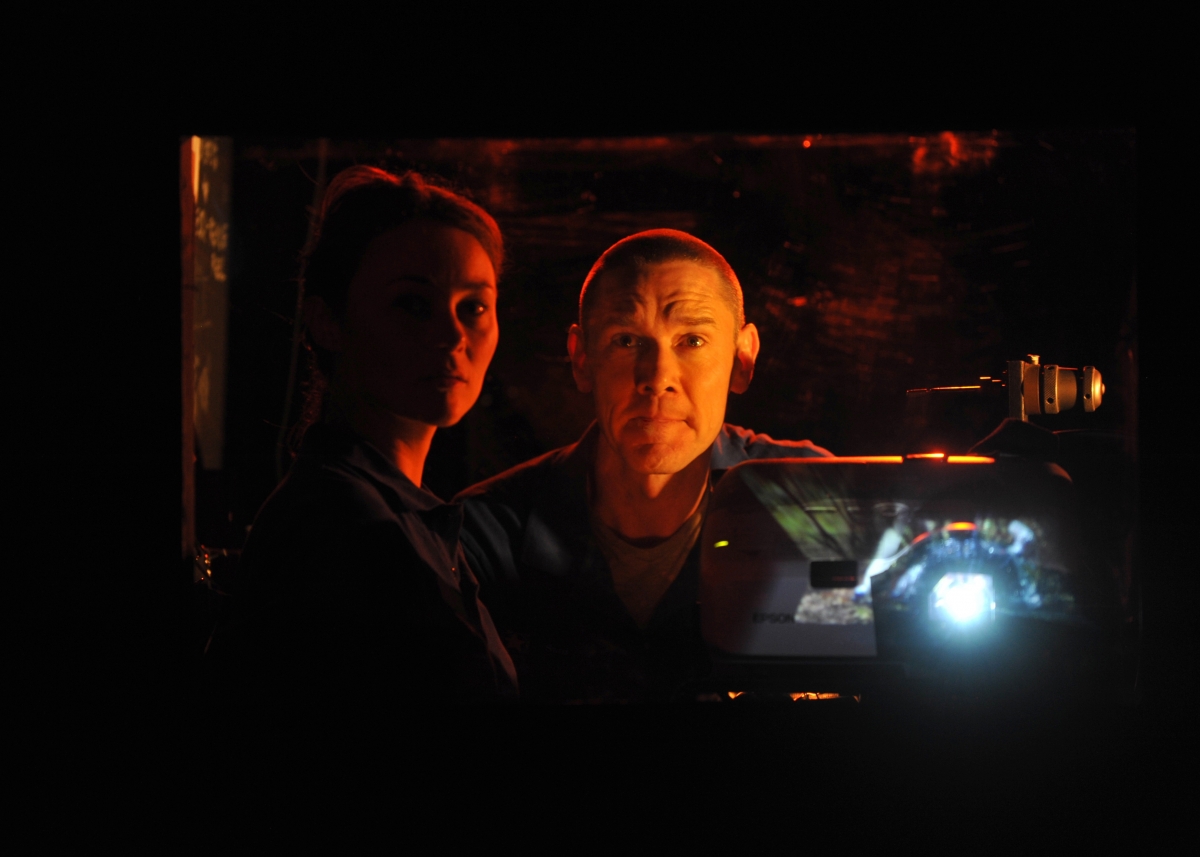American playwright Annie Baker won the 2014 Pulitzer Prize for Drama with her off-Broadway hit, The Flick. Set in a rundown movie theatre in Massachusetts, which happens to be one of the last theatres to show 35mm film projection in the state, the play revolves around the relationships and aspirations of three young and disparate employees set amid a world of change.
Opening with the finale of a movie screening, Sam initiates the new boy, Avery, into the monotony of cleaning the theatre and sweeping up the popcorn, which becomes a major focus of their daily ritual throughout the play. Slowly we learn snippets about these characters and are introduced to Rose, the projectionist. Short scenes with quick blackouts add immediacy to the phrasing and repetition of the play’s rhythms, interspersed as they are with theatrical finales from the second-rate movies they are showing, before the cleaning begins once again. There is almost a harping back to Waiting for Godot in its absurdity, while at the same time we are made keenly aware of the drudgery of those (Sam and Rose) for whom change is to be feared. In this sense The Flick seems even more relevant in today’s America than when it was written in 2013.
Ngaire Dawn Fair and Ben Prendergast in The Flick. Photos by Jodie Hutchinson
Nadia Tass’s direction is empathetic and sensitively crafted and shaped. She coaxes some excellent performances from her actors, exploring themes such as friendship and love, loyalty and deception, loneliness and fear from a bunch of misfits, working in dead-end jobs. In the process she manages to convey the quirks and foibles of the characters with humour and affection, so that we are sympathetic rather than critical of their plight.
Ben Prendergast gives a solid and totally truthful performance in the key role of Sam. Personally flawed and with little prospects for the future, he fluctuates between the life he would like and the reality that he must accept. His movie games with Avery are masterfully handled, his response to the movie buff’s skill and expertise giving some joy to his daily grind.
Kevin Hofbauer and Ngaire Dawn Fair
Kevin Hofbauer’s Avery showed us a deeply repressed and unhappy individual, desperately lonely but seemingly unable to accept either affection or love. One of his best scenes is his telephone call with an old friend in which he opens up in a way that he is never able to do with Sam. His was the most difficult role to come to grips with and he was controlled and believable, offering strength in his final scene.
Ngaire Dawn Fair as the emotionally perplexed Rose gave a beautifully nuanced and mesmerising performance. Her total obsession with herself is both funny, touching and sharply disturbing. Blithely oblivious both to Sam’s overtures and Avery’s anguish, she sails through the microcosm of her life in a complete bubble. It was a marvellous interpretation. Dion Mills fills out the cast in two small but important roles.

Shaun Gurton’s set evokes just the right level of seediness and decay. Cleverly using the cinema screen as the fourth wall, he replicates an old movie theatre, complete with faded red plush seats, old-fashioned swing doors and a perfectly centred projection box with its massive old projector. David Parker’s lighting is suitably atmospheric while the exaggerated soundscape of the movie and audio-visual music created by Russell Goldsmith and Daniel Nixon introduces the world of fantasy into an otherwise grim reality.
Baker’s play is acutely observed with well-rounded, complex characters that draw you in to their individual and collective worlds. In the style of modern American drama from Albee to Mamet, Baker’s text is both sparse and repetitive when exploring the daily boredom of trivial tasks, but becomes expansive at moments of discourse about the meaning of cinema in particular. The essence of Baker’s gift as a writer is her ability to avoid any real communication between the characters themselves, while injecting humour and poignancy in equal measure in moments of hilarity, awkwardness and sadness. She has been compared to a modern-day Chekov and there is certainly some resonance there.
The rhythms of the narrative for the most part work well, despite the play’











Comments
Log in to join the conversation.